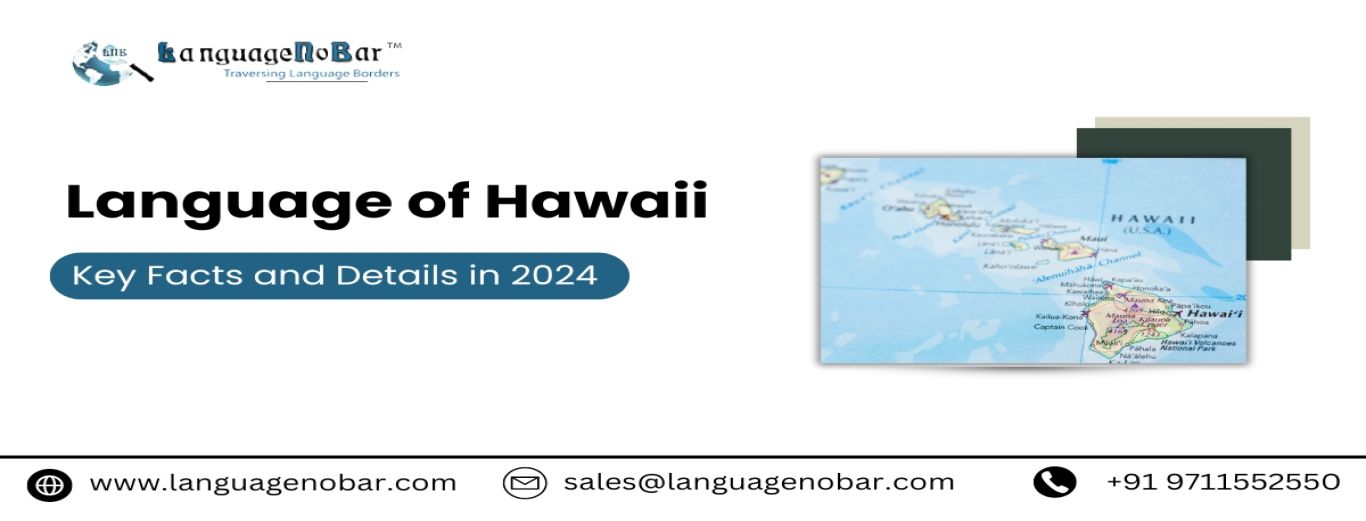Language of Hawaii: Key Facts and Details in 2024
- Blog
- Comments (0)
Language of Hawaii: Key Facts and Details in 2024
Image credits: Lingoda
Hawaii is a land of cultural amalgamation, rich heritage, and history. Approximately 1.44 million people reside in Hawaii according to the census of 2021. There are many lesser-known facts about Hawaii and its languages that are both charming and surprising. In this blog, we bring together such lesser-known facts about the languages of Hawaii and Hawaii itself!
Key Facts About Hawaii
- Did you know that it is one of the most densely populated states of the US, AND the only U.S. state that is not part of the North American continent?
- Hawaii became the 50th i.e. the last one in the list of 50 states of the US on August 21, 1959
- Hawaii is the only US state with two official languages,.e English and Hawaiian.
Primary Languages of Hawaii and Key Details
English, Hawaiian, and Hawaiian Pidgin (Hawaiian Creole English) are the primary languages spoken by the people of Hawaii and are used for conversations as per convenience in Hawaii. Let’s get into the history of these languages and their relevance today in 2024.
Image Credits: World Population Review
1) The Hawaiian Language
Image Credits: Statista
Hawaiian is an Austronesian language that belongs to the Polynesian language family and shares commonalities with Tongan and Samoan languages.
The language traditionally spoken in Hawaii was called 'Olelo Hawai'i, which means "Language of Hawaii" in the English language. It was the language used by Kānaka ʻŌiwi i.e. the native people of Hawaii whose ancestors inhabited the Hawaiian archipelago. Additionally, it has three dialects i.e. Hawaiian Pidgin, Kauaʻi, and Hilo.
Today it is used by the Niʻihau locals as their first language.
Officially Hawaiian was recognized in the state constitution in 1978, but did you know that the language was banned for some time? It was banned from being used in schools and government by the Americans who defeated the Hawaiian monarchs, as a way to exert control and increase the usage of English. It is believed that there remain only around 2,000 people who speak Hawaiian as the first language and around 24, 000 people speak it as a second language, that’s less than 1% of the population. This is the reason that UNESCO has added it to the list of “critically endangered” languages.
Often the word “Hawaiian” is used to address the language and the people, but Hawaiian people refer to themselves as Kama’aina which means “child of the land” in the Hawaiian language.
Contrary to other regions where Aloha means hello, in Hawaii, it has a more holistic meaning that means “to be in the presence of the divinity”.
2) The Hawaiian Script
The Hawaiian language has 13 letters which are a e i o u h k l m n p w and ʻ
- The letter ʻ, represented as a reversed apostrophe is a special character called okina. It represents a glottal stop (produced by momentarily blocking the airflow through the vocal cords and then releasing it)
- The kahakō i.e. a bar/macron “¯” above the vowel is used to indicate long vowel pronunciation.
Both the okina and kahakō are necessary to speak accurate and meaningful Hawaiian.
As an example, huli means "to turn" or "to search, while hūlī means "to peel" or "to remove the skin.”Hawaiian alphabets are written using only lowercase letters and Hawaiian has a unique pronunciation it uses sounds that don’t exist in the English language.
2) English
English is the most spoken language in Hawaii with 74.2% of people using it at home as of 2021. But fluency in English can’t be considered at par with the other states of the US.
Image Credits: United States Census Bureau
4) Hawaiian Pidgin or Hawaiian Creole English
Pidgin uses a combination of English and Creole, hence it is called the Creole language i.e. a language developed by combining other languages. It is spoken by approx. 1500 to 7 lakh people for their day-to-day activities. However, this is far in number as compared to the Hawaiian language, it is not an official language.
5) Other languages spoken in Hawaii
Due to immigration for food and work opportunities, 125+ other languages are spoken in Hawaii including Chinese (Mandarin and Cantonese), Korean, Japanese, Vietnamese, Thai, Filipino, Samoan, Lao, Khmer, Austronesian, Portuguese, Ilocano, and Spanish.
6) Hawaii's One-of-a-Kind Language University
The University of Hawai‘i at Mānoa Department of Linguistics is a unique and one-of-a-kind university in the USA. It offers a graduate program in language documentation and conservation in an attempt to save the Hawaiian language.
Languages in Hawaii have changed form over the years due to immigration, and influence from neighboring counties. English-to-Hawaiian translation is critical for keeping the conversation between people and for business-related networking. However, the Hawaiian language has contextual subtleties that can be understood by a professional translation service and certified translation service provider like LanguageNobar, where the team of linguists has a deep understanding of the dialects.







